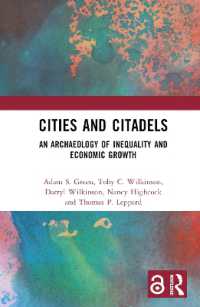Full Description
The Struggle for Human Rights evaluates the themes of law, politics, and practice which together define international human rights practice and scholarship. Taking as it's inspiration the 40 year career of international human rights advocate Philip Alston, this book of essays examines foundational debates central to the evolution of the human rights project. It critiques the reform of human rights institutions and reflects on the place of human rights practice in contemporary society.
Bringing together leading scholars, practitioners, and critics of human rights from a variety of disciplines, The Struggle for Human Rights addresses the most urgent questions posed within the field of human rights today - its practice and its theory. Rethinking assumptions and re-evaluating strategies in the law, politics, and practice of international human rights, this book is essential reading for academics and human rights professionals around the world.
Contents
Nehal Bhuta, Florian Hoffmann, Sarah Knuckey, Frédéric Mégret, and Margaret Satterthwaite: Introduction
Part 1. Arguing About the History, Theory, and Politics of Human Rights
1: Georges Abi-Saab: The Organic Intellectual
2: Hilary Charlesworth: Ritual and Ritualism in the International Human Rights System
3: Joseph H. H. Weiler: The Targeted Killing of Jesus Christ
4: Martti Koskenniemi: Rocking the Human Rights Boat: Reflections by a Fellow Passenger
5: Sally Engle Merry: The State of Human Rights Consciousness: Not Yet Endtimes
6: Euan MacDonald: Human Rights, Legitimacy and Global Governance
7: Henry Steiner: Democracy and Democracies
Part 2. Setting the Rights Agenda
8: Benedict Kingsbury: Human Rights in a Use Case World
9: Bruno Simma and Giorgia Sangiuolo: Advocating an Ad Hoc Forum for Business Human Rights Disputes
10: Olivier de Schutter: A Duty to Negotiate in Good Faith as Part of the Duty to Cooperate to Establish 'An International Legal Order in which Human Rights can be Fully Realized': the New Frontier of the Right to Development
11: Gerard Quinn: Re-considering Personhood: From 'Civil Death' to 'Civil Life' for Persons with Disabilities
12: Alicia Yamin: On Principle and Persuasion: Examining Philip Alston's Contribution to Economic and Social Rights through the Lens of Health
13: John Tobin: Teaching Human Rights: Four Key Capabilities
14: Malcolm Langford: Alston and Artificial Intelligence
15: Vitit Muntarbhorn: Towards ASEAN Human Rights Law
Part 3. Human Rights Mechanisms: Building, Reforming, and Critiquing Institutions
16: Thomas Hammarberg: Implementation of Treaty Obligations: Political Measures Expected of State Parties
17: Mac Darrow: Up the Stream without a Paddle - Human Rights Challenges in Mega-Infrastructure Finance and Investment
18: Andrew Clapham: Dilemmas Facing Commissions of Inquiry
19: Jose Alvarez: Quis Custodiet Ipsos Custodes? Philip Alston
20: Hélène Trigoudja: The Persuasive Authority of Philip Alston's Work for Human Rights Regional Bodies - United Nations Reports, Statements and General Comments Do Matter
Part 4. Human Rights Struggles
21: Nehal Bhuta and Rebecca Mignot-Mahdavi: Dangerous Proportions: Means and Ends in Non-Finite War
22: César Rodríguez-Garavito: Disrupting Human Rights: Existential Challenges and a New Paradigm for the Field
23: Obiora Okafor: Praxis and the International Human Rights Law Scholar
24: Sarah Knuckey and Margaret Satterthwaite: Should Human Rights Practice Be Rights-Based?
25: Florian Hoffmann: Quite Enough (Still): Human Rights in (Times of) Crisis
26: Frédéric Mégret: Alston in Alabama: Towards a Theory of Praxis in International Human Rights



![大学入試問題集 岡本梨奈の古文ポラリス[3 発展レベル]](../images/goods/ar2/web/eimgdata/EK-1283625.jpg)




